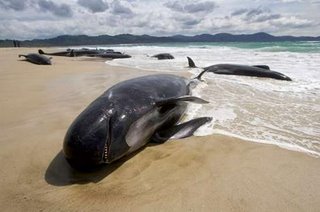Recently, I've become kinda obsessed with → NPR. I've listened to it intermittently before, but lately, I listen to it all the time when I'm in the car. Part of it, I think, is that I now have my own car for the first time in a long time, so I can listen to whatever I want. Also, I've found that, instead of feeling angry and irritated while I drive, I'm much calmer and less "road ragey" when listening to the soothing voices on NPR. And also, I'm LEARNING something! Woo-hoo!
So, this week, I heard a segment on "Talk of the Nation" about noise. Here's the blurb:
→ A Defense of 'Noise'
Electrical engineer and writer Bart Kosko says not all noise is bad, and some could even help make you smarter. Kosko, author of the book Noise, talks about how it can help with tasks such as signal processing.
It was an interesting segment. They talked about how digital noise and MP3 music players are causing more and more hearing loss. But some noise is good and that studies have shown that, while a lot of noise, especially many different sounds, can be distracting, most people think best with a little bit of noise. They said most people sleep better with some white noise, like a fan, mainly because it drowns out other noises. They also talked about the science of hearing loss, how we all start losing hearing as we get older, and how there are certain frequencies that only teenagers or young people can hear. Then they started talking about different sound waves and the use of sound waves.
And that's when I heard one of the most disturbing things I ever did hear.
Sonar used by the US Navy can emit continuous sound well above 235 decibels, an intensity comparable to a Space Shuttle at blastoff. Marine mammals have extremely sensitive hearing (think about the songs of Humpback whales that can be heard for miles), and intense sonar  blasts can disturb, injure, and even kill them. Whales exposed to high-intensity sonar have repeatedly stranded and died on beaches around the world - some bleeding from the eyes and ears, with internal bleeding and severe lesions in their organ tissue. At lower intensities, sonar can interfere with the ability of marine mammals to navigate, avoid predators, find food, care for their young, and, ultimately, to survive.
blasts can disturb, injure, and even kill them. Whales exposed to high-intensity sonar have repeatedly stranded and died on beaches around the world - some bleeding from the eyes and ears, with internal bleeding and severe lesions in their organ tissue. At lower intensities, sonar can interfere with the ability of marine mammals to navigate, avoid predators, find food, care for their young, and, ultimately, to survive.
A recent lawsuit says that the use of this sonar violates environmental laws (not that laws have ever stopped our government or military before...)
→ Full Story: U.S. Navy Sued over 'Ear-Splitting' Sonar on Whales
I am so disturbed and distressed by this. As I drove in my car listening to this, I was disgusted to be a human. We strip forests to build houses and then complain when the deer run out in traffic or eat our flowers. We build in wetlands and swamps, and are somehow surprised when they flood.
I began to imagine a world without humans - what if some catastrophic event wiped us off the planet? I thought this would probably be some disease, like avian flu or the ebola virus or something.
I imagined that it wouldn't take long for the weeds and bushes on the side of the highway to overtake the highway, their strong, organic roots eventually breaking the concrete apart and turning our roads and bridges into rock gardens. I imagined animals running around carrying on the circle of life without being blindsided by a gunshot, a vehicle, toxic substances, polluted air and water. How awesome would it be if this "civilization" became a giant playground for our natural world?
The idea of dying in this way didn't upset me at all, I actually felt comforted by this plan. I wish it could work this way, but it's just a dream. For now, I hope we can just save the whales. Again.
Saturday, September 16, 2006
Noise
Subscribe to:
Post Comments (Atom)
No comments:
Post a Comment